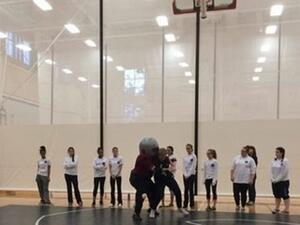Fighting Back
Can someone please tell me when taking advantage of women became an acceptable thing to do? Stories of assault on college campuses and towards so many people—as well as the overwhelming lack of prevention—give quite the impression that violence is an untouchable part of society. I’ve learned recently, though, that it doesn’t have to be.
At my high school, there is one class that responds to violence towards women: Power Up. Many students dismiss the class as one that simply teaches girls how to defend themselves. Certain students belittle the nature of the defense and claim that the issues at hand are not mainstream enough to necessitate a class.
These students are wrong. Even if the class represented only the physical side of self-defense, it would still be useful, as violence is extremely prevalent, with one in three American women facing probable sexual abuse in her lifetime. Over the course of the past semester, I have found that the class contains far greater meaning than defense moves practiced each afternoon. My classmates and I have discussed dating violence, bullying prevention, and assertiveness. As I’ve learned the different steps towards physical protection, I’ve also been able to gain a greater understanding of violence, which affects both men and women.
It’s difficult to overturn a system that has been in place for such a long time. Violence against women has been around forever, but it still goes unreported and undiscussed in many circles. Even though it’s nice to have an arsenal of moves ready for use, wouldn’t it be really nice to try to eradicate sexual assault from society instead?
Rebellion isn’t just a constant offensive against some greater power. It’s also a process of defending what’s right, and in taking Power Up, I have found that people should protect their bodies against those who might not appreciate boundaries. So, in learning how to protect myself, I’ve taken on an act of rebellion that really shouldn’t have to be rebellion at all. Self-defense may be just one side of the story of how people should approach assault; however, it’s an important tool to utilize, provided that the defense is supplemented by a greater understanding of why it matters.
The class I took culminated in a graduation where the students presented the different moves that were studied over the course of the semester. Various individuals from around Boston spoke at the graduation, including the parents of young women who have died in instances of dating violence. Malcolm Astley, the father of a Wayland, MA high school student murdered by her ex-boyfriend a few years ago, gave a short speech in which he recommended that high schools devote fewer hours to standardized testing and instead focus on what matters in adulthood, such as self-defense. I strongly agree and hope that other schools will follow in Wellesley High School’s path, teaching students of all genders about violence.
After all, rebellion is about redefining the belief of the majority, and it’s about time that we remind the world that it’s not okay to be violent towards anyone.
This piece was written as part of JWA’s Rising Voices Fellowship.








Yay, Rachel!